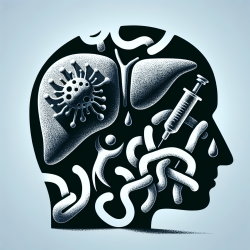Hepatitis C Virus (HCV) infection poses a significant health challenge, particularly among injection drug users (IDUs). This population faces unique hurdles that complicate the treatment process, including substance abuse, mental health issues, and socioeconomic barriers. Understanding these challenges is crucial for healthcare practitioners seeking to improve treatment outcomes for HCV-infected IDUs.
The Impact of Substance Abuse
Substance abuse significantly affects the natural progression and treatment of HCV. Excessive alcohol consumption is prevalent among IDUs and is known to accelerate liver damage. This makes it imperative for healthcare providers to support alcohol reduction strategies as part of HCV treatment plans. Additionally, poor nutrition often accompanies substance abuse, further complicating the body's ability to fight the virus.
Mental Health Considerations
Mental health issues are common among individuals with chronic HCV infection, particularly those with a history of drug use. Depression and anxiety can be exacerbated by interferon-based therapies used in HCV treatment. Practitioners must carefully assess psychiatric health before initiating therapy and consider prophylactic antidepressants to mitigate these effects.
Socioeconomic Barriers
IDUs often face socioeconomic challenges that hinder successful HCV treatment. Lack of stable housing can impede medication adherence due to inadequate storage facilities. Transportation barriers may also limit access to regular medical appointments. Addressing these issues requires a holistic approach that considers the broader social determinants of health.
Improving Treatment Adherence
Adherence to HCV therapy is critical for achieving sustained virological response. While active drug use can diminish adherence rates, specialized programs that integrate substance abuse management have shown success in improving outcomes. Multidisciplinary care teams that include mental health support can enhance adherence and overall treatment efficacy.
The Role of Education and Support
Education plays a vital role in reducing reinfection rates among IDUs. Safe injection practices and needle exchange programs are effective measures that should be integrated into care plans. Additionally, fostering trust between patients and healthcare providers is essential for overcoming mistrust and misinformation about HCV treatment.
Research Priorities and Future Directions
Ongoing research is necessary to refine strategies that improve adherence and treatment outcomes for HCV-infected IDUs. Investigating the long-term effects of medicinal marijuana on liver disease progression and quality of life is one area ripe for exploration. Moreover, understanding the complex interplay between bio-psycho-social factors in this population will inform more effective interventions.
In conclusion, addressing the therapeutic challenges faced by HCV-infected IDUs requires a comprehensive approach that considers substance abuse, mental health, and socioeconomic factors. By implementing evidence-based strategies and fostering supportive care environments, healthcare practitioners can improve treatment outcomes for this vulnerable population.
To read the original research paper, please follow this link: Therapeutic challenges in hepatitis C-infected injection drug using patients










